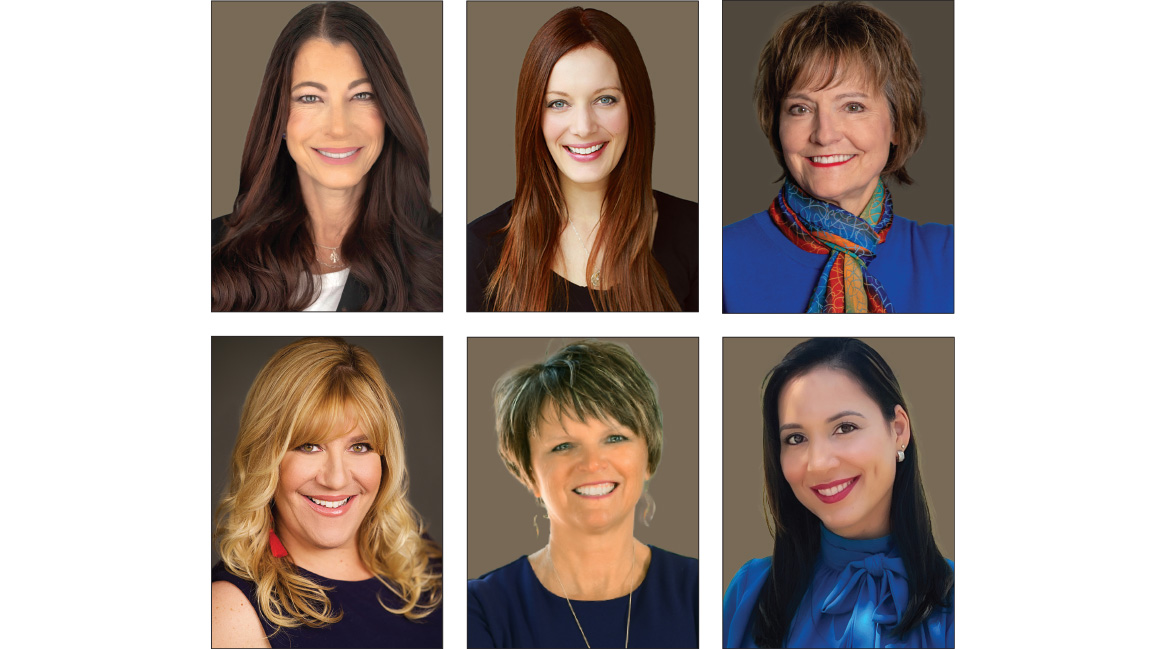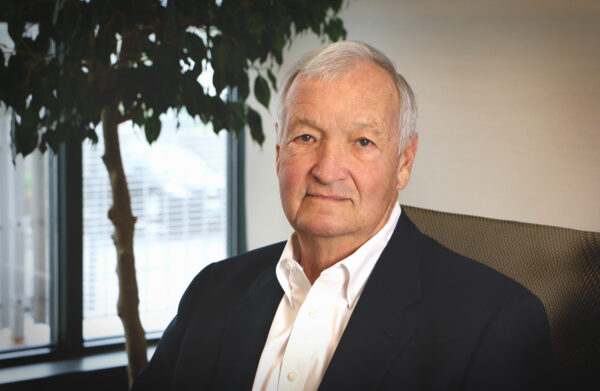Six female leaders from different segments of the industry share insights.
In celebration of the 10th anniversary of The Cannata Report’s Women Influencers franchise, we contacted six women in diverse roles in different segments of the office technology industry to get their perspectives on their experiences as a woman working in this industry and the changes throughout their careers. The panel includes Dawn Abbuhl, president, Repeat Business Systems; Sarah Custer, vice president, sales operations, Distribution Management; Mary Jo Johnson, owner and chief executive officer, EO Johnson Business Technologies; Kate Kingston, president, Kingston Training Group; Kim Louden, vice president of sales, GreatAmerica Financial Services; and Emily Rodriguez, sales manager, Hytec Dealer Services.
What was your first job in the office technology industry, and what was the biggest challenge of being a woman when you started?
Abbuhl: My first job in the office technology industry was actually my current job. I started over 30 years ago when I was in my early 20s and newly married. At the time, my biggest challenge that was related to being a woman was more of an annoyance than a challenge. Manufacturers and vendors refused to believe I was the decision-maker and continued to ask for my husband, who never, and still hasn’t to this day, had that role. This included leasing partners, hardware partners, companies trying to sell us advertising, etc.
Custer: My first job in the office technology industry was while I was still in high school. I worked summers at Distribution Management (formerly Supplies Network) cleaning up the database, helping out with administrative tasks, keying orders, and eventually taking overflow phone calls and backing up sales reps when they were out of the office. In the early years of my career, most of our sales managers and top sales reps happened to be women. I worked hard to prove myself, but in my mind, it wasn’t due to my gender. It was because I was young and inexperienced.
I wanted opportunities to learn and grow in the business. It wasn’t until later when I had a territory of my own, I started attending offsite meetings and industry events and noticed I wasn’t surrounded by many women, most noticeably at the executive level.
Johnson: Since ours is a family business, my parents encouraged my brother and me to fulfill our “want lists” of things like a new bike, gas, and pocket money by working at EO Johnson Company. During high school in the 1970s, I was typically filing, logging service calls, and entering customers into our first computer. Most of what I did was secretarial, so I worked with many other women at the company as that was the social norm of that time.
When I returned to EO Johnson after my career in insurance in 1985, the times had changed a bit…but not much. We did start to see more female reps selling copiers, overhead projectors, and fax machines, and I was one of them. But there were lingering perceptions that the machines were too complicated or even too heavy for women. With all the history I have experienced in our industry, I think the one thing that held me back, if even just a little, was my own concerns about being a woman in a male-dominated industry and the perceived social expectations.
Kingston: I came to New York City almost 30 years ago with a degree in theater. I was offered a temp receptionist job at an on-demand print company. After a few days on the job, the president offered me the job full time as he’d gotten many comments that I sounded great on the telephone. I declined the position; after all, I had moved to NYC to become an actress.
After giving it some thought, I figured that I could exercise my acting skills in another way; I could put myself into a salesperson character and schedule appointments. So, I went back to him, and said, “Let me make appointments for you, and you don’t have to pay me unless they happen.” This was literally fate talking because back then there weren’t appointment setters, and I was offering to do the hardest part of the sales process by scheduling the meetings for the executives.
He was skeptical. After all, I was just a young girl answering phones, but he agreed to my proposal since he had nothing to lose: no appointment, made, no need to pay. So, the next day, I came in to prove myself. They handed me a Crain’s Book of Lists in New York City, a list of all the companies that are very large, and left me to it. It was alphabetized, so the first one on the list was Avon, the makeup company.
I had used Avon makeup, and I knew they wanted to sell more makeup, and when I called the chief marketing officer for Avon, I created a script/conversation on that telephone pitch on why he should stop his business day to meet with us. I tied my product, on-demand printing, to selling more makeup, and I knew I was on to something, and because I wanted to be an actor, scheduling these meetings with C-level executives didn’t scare me because they weren’t casting directors, so I didn’t take it personally when they said no.
After realizing my success as an appointment setter, I approached a Global Imaging Systems’ company, Carr Business Systems, and pitched them on letting me train their sales team to make more meetings. From that success, Dan Cooper who worked at Global, now CEO of Novatech, gave me a speaking opportunity at one of their national meetings and I wrote deals at the event with 12 other Global companies. I’ve come full circle as I am working for Dan again this year.
One of the challenges in the imaging channel as a woman is knowing the need for more gender-balanced hiring and promoting when in reality, it should not be your gender that qualifies you, it should be based on the skill base and results as the measure of success and promotion as our new norm. That’s what we women are looking for, that’s what we, and I’m sure progressive men, want.
What I’m waiting for is when this question does not need to be asked. What I’m counting on is when this question seems silly because people will be judged on the merit of their sales, their forecasts, their relationship building, and adding positively to the culture of the company, regardless of their gender, religious beliefs, or age.
Louden: I started my career as a credit analyst at a financial services company. I was one of the only women in the credit department. Having previously been surrounded by more women in my prior banking job, this was quite an adjustment for me. I was in a new role, at a new company, without any support system or other women I could relate to, which was difficult to navigate. I was young, newly married, and starting a family.
The men I worked with were more established, and many had stay-at-home wives. I often was left out of important decisions, which made me feel as if my perspective and opinion didn’t matter. I didn’t have a female mentor or colleague I could lean on for advice either, so it was a very challenging time for me.
Rodriguez: In 2006 I moved to Florida from Cleveland, Ohio, where I was in the banking and finance industry. I knew I did not want to continue down that path as I did not enjoy the culture of the industry. I struggled to find my new career path as a new Florida resident and found myself unemployed in 2007. This is where a family friend that worked at Hytec notified me there was an opening as the receptionist.
It was not what I was looking for but thought it could be a great opportunity to start a new career in a completely different industry, and I knew that I could learn and grow within the company. I immediately fell in love with the culture not only that Hytec offered but also with what the entire industry offered as well. As with most new roles, there were challenges, even more so being a woman and a very young woman. I found it difficult and challenging at times to earn people’s respect, but I was very determined to overcome that.
How did you overcome that challenge?
Abbuhl: It was actually one of the most valuable lessons I have learned. At first, I was insulted and annoyed, but then I realized that we were a new business, I was in my very early 20s, and none of these people really knew me. It was important that I built a relationship. I also had to act in ways that would earn respect. Some of these relationships have endured to this day.
Custer: I think acknowledging and talking about the challenges women face has been very helpful for me. I have to admit, I was a bit taken aback when I realized these issues still exist for women after all what past generations have overcome. The last time someone outwardly told me I couldn’t accomplish something because I was a “girl” was in middle school, and I quickly set the record straight on that. What we now collectively face is more nuanced and harder to identify. It is difficult to overcome something you can’t easily detect, such as societal norms and unconscious bias.
Johnson: I stopped overthinking social expectations and physical restraints and just did the work. What I loved then and still love now is our ability to help other businesses run efficiently, productively, and securely. Every day, we can show others how to utilize their business technology in the easiest, most productive, and safest ways. When I stopped thinking of myself in the gender norms of the times and realized I had become an industry expert, I was able to assist customers in new ways. And it remains a blessing to share our company’s insight and knowledge. Everyone can be helpful in driving digital transformation.
Louden: I looked beyond my function and developed a network within the company, which was a helpful first step. I was eventually offered the opportunity to join GreatAmerica Financial Services. Upon joining the GreatAmerica team, I immediately began to feel the difference in the culture. Mentorship and empowerment were encouraged. Tony Golobic and Doug Olson, both top-level members of the executive leadership team at the time, emphasized how every person was important.
That mentality allowed me to build up my confidence and voice my opinions within the walls of GreatAmerica. It took a few more years of support and coaching for me to feel comfortable talking with customers and partners, but with that support system behind me, I was able to come into my own, gain influence, and earn the respect of those around me. Having a good mentor, or two in my case, can be transformational.
Rodriguez: To overcome this challenge, I started to develop rapport and relationships with my colleagues. Getting to know them better and letting them know me as a person. It was also very important for me to learn the industry, and learn more about Hytec and the services we provided to demonstrate competence and expertise in not only my position but in the industry.
Do you think the office technology industry has improved for women, and what are some of the signs that it has improved?
Abbuhl: There have been real improvements from 30 years ago. Magazines have showcased women in office technology. The Cannata Report was one of the first to do this, as well as honor women in this industry each year. The reality is, though, that this isn’t the most attractive industry for women. Women are still underrepresented here as they are in other technology industries. That said, I continue to see a lot of change and feel even more momentum than ever.
Custer: I do believe things are getting better. The fact that we’re engaged in this dialog is a testament to the willingness of many in the industry to address the issue. The studies are in, facing this together will only make our businesses stronger, helping the industry as a whole. A huge thank you to The Cannata Report for recognizing this and being at the forefront of this important dialog as we celebrate the 10-year anniversary of the Women Influencers franchise. It means a lot to me personally to be able to learn about the incredible women in our industry and the impact they are making.
Johnson: More people are venturing into IT, business information, and data security work because we live in it every day. However, there are still more men in our industry, and we still see more men applying for our open positions. We haven’t seen much change in this trend. Bringing more women into business technology requires an intentional focus. That includes building interest in technology, creating mentorships, and getting involved in women’s networking groups. I’m also encouraged by the focus I see on getting more women and girls interested in STEM.
Kingston: When I’m training a salesforce, usually less than 25% of it are women. This has been consistent for the past 25 years I’ve been in this industry. It has increased slightly, but I still see very few sales executives and leaders in our industry that are women.
Louden: It definitely has improved. I am proud of how many strong women leaders there are in our industry, many of whom have a story like mine. I think that’s why so many of us work so hard to be good role models and mentors for the next generation of women leaders. I never envisioned myself in a sales leadership role until I was encouraged by a colleague who, at the time, believed in me more than I believed in myself. There are so many wonderful leaders—men and women—in this industry that are incredibly open to sharing their stories or advice.
Rodriguez: I believe the industry has improved for women. I can see it when I attend different industry events and find women leaders not only attending the events but being invited to participate in different dealer or OEM panels. The industry has allowed women the opportunity to add more value to this great industry and the opportunity to be a voice in taking businesses to the next level.
What can the office technology industry do better to be more accepting of women in key leadership roles?
Abbuhl: Management is a skill that has to be learned. It is important for women (and men) to acquire that competency—to practice it, grow it, and get feedback. It is helpful to have a really excellent mentor. One great book that has helped me in my leadership is “What Got You Here Won’t Get You There” by Marshall Goldsmith. I think many industries can be challenging for women (and men too).
Custer: Certainly, the more women we have in key management roles, the more acceptance there will be. And the more businesses in our industry that can encourage women to raise their hands and enable movement from middle to senior management, the better. Mentorship of these potential candidates is one important avenue.
I believe another key element that helps everyone is not only an individual business’s work culture supporting work-life balance for all employees, but also a surrounding industry and community that supports that idea as well. For example, if we can get to a place where the societal expectation is that a man staying home with a sick child happens just as often as a woman staying home, everyone benefits.
Johnson: We need to recognize that as a male-dominated industry, we simply don’t have as many women currently who have the same years of experience and have been able to move up through the ranks like their male counterparts. It can be a limiting factor for moving into key management and executive roles. So, sometimes a female employee’s path may look different. Their experience may be stronger in business consulting, or their training may be in newer areas like artificial intelligence and data analytics.
That doesn’t limit them in any way to making profound contributions at the management level. In fact, they may bring something new and really valuable to the table. I think there is new energy in helping women rise, and I see positive change occurring.
Kingston: The facts remain in 2023 that women must show business excellence in everything we do. We must perform with no excuses. We excel at tapping into the best people. Women should be commended for our ability to see multiple sides and multiple points of view and show no hesitation in asking for help or showing vulnerability in the office. Women know that does not diminish our power. Fair or unfair, women must be so outstanding that they can’t help but let us rise.
I believe more women in key management positions would be attractive to other female employee candidates. If they see other senior-level executives are females, they will understand that there are opportunities for them to advance inside the company.
Louden: Continue to push and encourage the women in your company to try new things and give them a safety net if they stumble. Those small setbacks are often where real and impactful learning occurs, but too often women are afraid of making mistakes. As an industry I think we can continue to elevate the good work women are doing to evolve and inform the future of our channel. Everyone within our industry has an opportunity to support and mentor others.
As an industry, we can also strive for open-mindedness as we listen to the ideas of others; this mindset can fuel innovation too because it makes people feel they can safely share bold ideas.
Rodriguez: There is always room for improvement, and as we look to progress with diversity and equality, it’s important to give women the same opportunities as our male counterparts. This could include mentorship, training programs, and resources that would help women gain the skills and confidence to succeed. It is also important to create an environment where both men and women will be respected and empowered.
What words of encouragement do you have for women who may be discouraged from working in the office technology industry, an industry that could still be challenging for women?
Abbuhl: My advice to motivate anyone having challenges in their industry is to get honest feedback, really listen to it, and sincerely try to grow and change your patterns if needed. It is important to always try to get better, build authentic relationships, and give back when and as much as you can. I don’t try or encourage women to acquire masculine traits or leadership styles but to “lean in” to their own gifts, such as empathy, compassion, intuition, being organized, etc., and acknowledge their own competence and whatever their unique gifts are, and build on those.
Custer: We work in a great industry that has grown and evolved to survive and thrive. The challenges women face aren’t unique to the imaging channel. I think the best thing we can do is keep an open dialog and continue to challenge the status quo. A dear friend gave me a gift with a meaningful quote by Maya Angelou inscribed on it: “Each time a woman stands up for herself, she stands up for all women.” I try to remember this when challenges arise.
Johnson: In my experience, nothing we do in business that is truly great ever comes easily. So, my recommendation is to take the risk and jump in. The world of business technology is evolving rapidly and so are the educational opportunities to support it. It’s hard for us to even imagine the positions we might be hiring for 10 or 20 years from now. It is a challenging, ever-changing, and enjoyable career. So, go for it!
Kingston: Most industries offer challenges for women, so I don’t believe that an ambitious woman can be swayed from trying to succeed in anything she wants to do, and technology is such a great industry to be in as it is a necessary component of any business and industry. Technology is constantly evolving and changing. You don’t have to be stronger than a man physically to do a great job in technology sales, so it’s a great place for us to showcase our skills and that the harder you work in sales, the more money you make.
One thing I have noticed in my many years of working with BTA dealers is that if there is an ambitious woman on the team, she is usually that dealership’s breadwinner because “There is no force equal to a woman determined to rise.” – W.E.B. Dubois
Louden: Don’t be afraid to ask questions, try new things, and be relentlessly curious. Never stop asking “Why?” and learn as much as you can as often as possible. In a world where information can be acquired with a few keystrokes, knowledge has become somewhat cheap. Curiosity, on the other hand, displays passion, which will stand out in a crowd. I think about a quote from Albert Einstein, “I have no special talents. I am only passionately curious.”
I believe curiosity can take women a long way in their careers. Sometimes getting to the next level in your career can take longer than you’d like, but if you can maintain your sense of curiosity, surround yourself with strong role models (both inside and outside the industry), display confidence (even when you have none), and take strategic risks; I promise it will pay off.
Rodriguez: From experience, I know mentors can have a great impact on one’s life. I encourage women to find mentors in the industry who can be sources of support, encouragement, and guidance. Don’t shy away from celebrating one’s success, and be proud of one’s accomplishments, no matter how small they may seem. Facing challenges with a positive and overcoming attitude, gives us the power to make a meaningful difference not only in the industry but in our personal lives. We can be a force for positive change!





